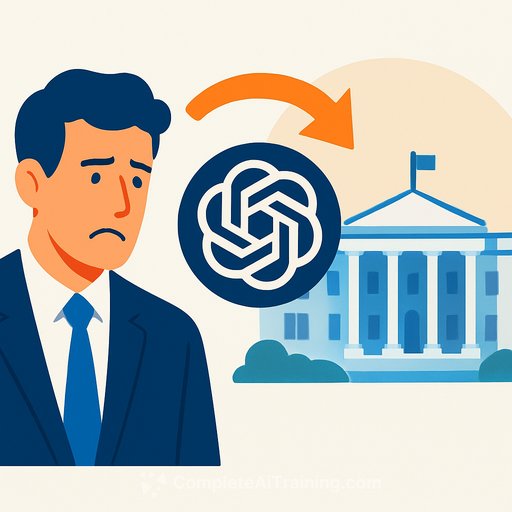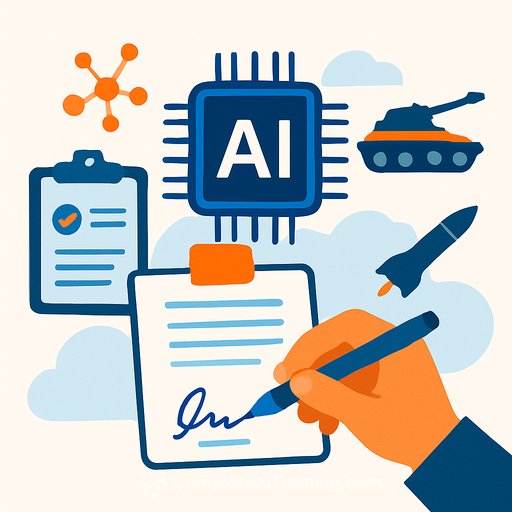OpenAI walks back talk of a federal "backstop" as Washington signals no AI bailouts
OpenAI spent Thursday clarifying comments from its chief financial officer after she backed a federal guarantee to support the company's heavy spend on chips and data centers. Within hours, Sarah Friar said, "OpenAI is not seeking a government backstop for our infrastructure commitments… I used the word 'backstop' and it muddied the point."
CEO Sam Altman reinforced the message, writing that governments "should not pick winners or losers," and "taxpayers should not bail out companies that make bad business decisions." The White House also pushed back: President Donald Trump's AI czar David Sacks said, "There will be no federal bailout for AI."
What sparked the cleanup
At a Wall Street Journal tech conference, Friar said a government guarantee could "drop the cost of the financing" and "increase the loan to value." When asked if she meant a federal backstop, she replied: "Exactly."
She later reframed the point as a call for public-private coordination to expand U.S. industrial capacity, not a request for taxpayer protection. She also noted that OpenAI has had recurring White House engagement on AI policy. That proximity, combined with trillion-dollar market commitments, put the remarks under a spotlight.
The stakes: unprecedented spend, thin profits
OpenAI's valuation now sits around $500 billion, with roughly $1.1 trillion in agreements across chipmakers and cloud providers. The company just announced a $38 billion, seven-year cloud deal with Amazon.
Despite the scale, OpenAI has yet to turn a profit. Friar previously projected $13 billion in 2025 revenue, a small slice of its long-term commitments. That gap fuels concern about an AI bubble-and who bears the downside if big bets sour.
Why this matters for government officials
- Loan guarantees vs. bailouts: A guarantee lowers financing costs but shifts risk to the public if a borrower defaults. Bailouts rescue firms after losses. If guarantees are ever considered, they should be narrow, capped, and consistent with federal credit policy guardrails such as OMB's credit program standards.
- Avoiding moral hazard: Altman's stance-no bailouts, no picking winners-aligns with competition-first policy. Any support should be market-neutral and open to multiple qualified providers.
- Industrial capacity: The government is already investing in chips and manufacturing through programs like the CHIPS Act. If agencies explore AI infrastructure incentives, they should favor transparent, competitive programs over firm-specific guarantees. See CHIPS program details.
- Critical infrastructure impact: Data centers draw on power, land, and water. State, local, and federal bodies will face siting, grid, and permitting questions. Tie any support to clear commitments on energy efficiency, reliability, and community benefits.
- Safety and security: Procurement and funding levers can require adherence to recognized standards (e.g., NIST's AI Risk Management Framework) and independent audits. NIST AI RMF.
- Competition and vendor lock-in: Encourage multi-cloud and interoperable architectures in grants and procurement. Preserve exit options to reduce systemic risk if a major provider stumbles.
Questions to ask before backing any AI infrastructure
- What public purpose is served (national security, resilience, workforce, regional development), and how is it measured?
- What are the loss caps, trigger conditions, and sunset dates for any guarantee or credit support?
- Are access, openness, or data portability requirements in place to strengthen competition and reduce lock-in?
- Which safety, cybersecurity, and model governance standards will be mandatory, and who verifies compliance?
- What is the contingency plan if the firm fails-orderly wind-down, service continuity, and asset transfer?
Signals to watch
- Whether agencies propose new credit facilities or clarify that existing programs won't cover AI infrastructure risks.
- Congressional hearings on AI market concentration, data center buildouts, and systemic risk.
- Financing spreads for data center projects and chip prepayments-are lenders pricing in higher risk?
- Interagency guidance on procurement, safety baselines, and competition safeguards for AI services.
Bottom line: OpenAI says it doesn't want a federal backstop, and the White House says there won't be bailouts. If support is considered at all, it should be targeted, competitive, and bounded-protecting taxpayers while advancing clear public objectives.
If you're responsible for staff upskilling on AI policy, safety, or procurement, see role-based options here: Complete AI Training: Courses by Job.
Your membership also unlocks:





